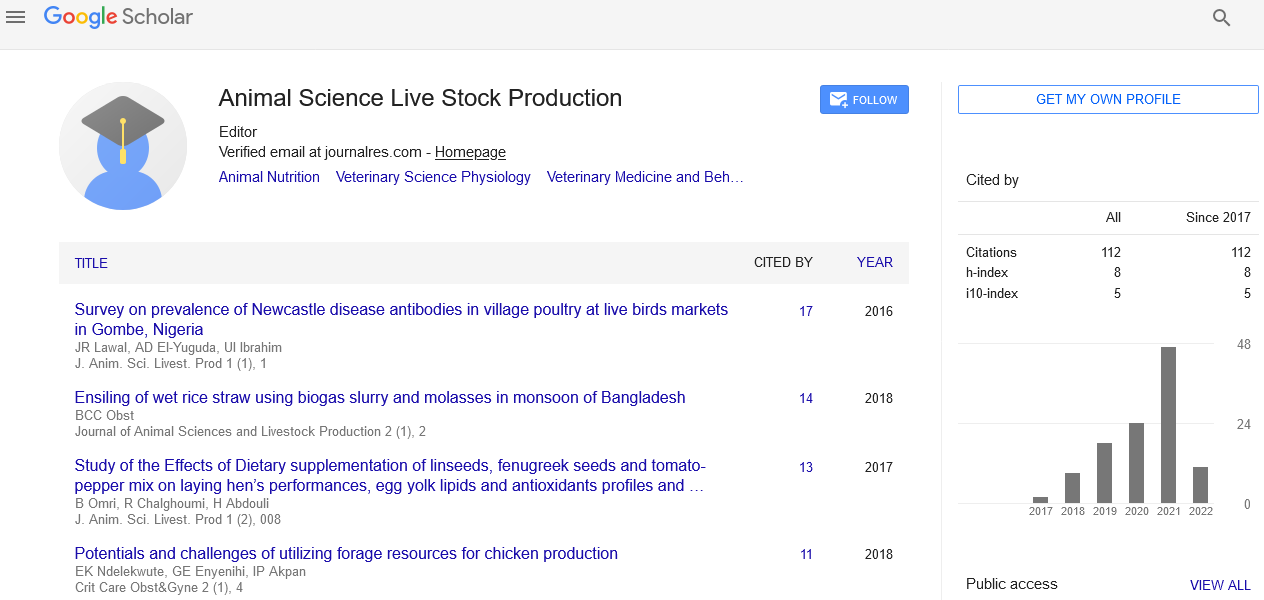Perspective - (2024) Volume 8, Issue 1
Vital Role of Veterinary Care in Animal Health and Welfare: beloved pets
Olivia Jones*
Department of Animal Sciences, Brown University, United States
*Correspondence:
Olivia Jones,
Department of Animal Sciences, Brown University,
United States,
Email:
Received: 28-Feb-2024, Manuscript No. IPJASLP-24-19312;
Editor assigned: 01-Mar-2024, Pre QC No. IPJASLP-24-19312 (PQ);
Reviewed: 15-Mar-2024, QC No. IPJASLP-24-19312;
Revised: 20-Mar-2024, Manuscript No. IPJASLP-24-19312 (R);
Published:
27-Mar-2024, DOI: 10.36648/2577-0594.8.1.08
Introduction
In a world where animals play diverse roles, from beloved pets
to vital contributors in agriculture, veterinary care stands as a
cornerstone of animal health and welfare. The field of veterinary
medicine encompasses a broad spectrum of expertise, ranging
from preventative care to specialized treatments. Through their
dedication and expertise, veterinarians contribute significantly
to the well-being of animals, thereby ensuring harmonious
coexistence between humans and the animal kingdom.
Preventative medicine forms the foundation of veterinary
care. Regular check-ups, vaccinations, and parasite control are
essential components in safeguarding animals against diseases
and ensuring their longevity. Veterinarians play a crucial role
in educating pet owners about the significance of preventative
measures and guiding them in developing tailored care plans
for their animal companions. By promoting proactive health
management, veterinarians not only prevent suffering but
also alleviate the burden on healthcare systems caused
by preventable illnesses. In addition to preventative care,
veterinary medicine encompasses diagnostics and treatment
for a myriad of ailments. Whether it’s a routine surgery, a
complex medical condition, or emergency care, veterinarians
are equipped with the knowledge and skills to address diverse
health issues in animals. From companion animals like dogs
and cats to livestock, exotic species, and wildlife, veterinary
professionals cater to the health needs of a wide array of
species, each with its unique physiological and behavioral
characteristics.
Description
Veterinary care extends beyond domestic settings to encompass
broader aspects of animal health and welfare. In agricultural
contexts, veterinarians play a pivotal role in ensuring the
health and productivity of livestock. They collaborate with
farmers and animal producers to implement disease control
measures, optimize nutrition, and enhance animal husbandry
practices. By promoting sustainable and ethical farming
practices, veterinarians contribute to the welfare of both
animals and humans, ensuring a safe and reliable food supply
chain. Furthermore, veterinarians are indispensable in wildlife
conservation efforts. They engage in research, monitoring, and
intervention programs aimed at protecting endangered species
and preserving biodiversity. Whether it’s treating injured
wildlife, conducting disease surveillance, or mitigating humanwildlife
conflicts, veterinarians work tirelessly to safeguard the
delicate balance of ecosystems and promote the coexistence
of humans and wildlife. In recent years, the field of veterinary
medicine has witnessed remarkable advancements driven
by technological innovations and scientific discoveries. From
cutting-edge diagnostic tools to novel treatment modalities,
veterinarians have access to a diverse array of resources to
enhance their ability to diagnose, treat, and manage animal
health conditions effectively. Additionally, ongoing research in
areas such as genomics, regenerative medicine, and behavioral
science holds promise for further improving veterinary care
and pushing the boundaries of what is possible in animal
health. Despite these advancements, veterinarians continue
to face various challenges, including issues related to animal
welfare, zoonotic diseases, and access to veterinary services in
underserved areas.
Conclusion
In conclusion, veterinary care plays a vital role in safeguarding
the health and welfare of animals across diverse settings,
from households to farms and natural habitats. Through
their expertise, compassion, and dedication, veterinarians
uphold the principles of animal welfare and contribute to
the betterment of society as a whole. As we navigate the
complexities of coexisting with animals, the importance of
veterinary medicine remains undeniable, serving as a beacon
of hope for a future where animals thrive alongside humans in
harmony and mutual respect.
Citation: Jones O (2024) Vital Role of Veterinary Care in Animal Health and Welfare: Beloved Pets. J Animal Sci. 8:08.
Copyright: © 2024 Jones O. This is an open-access article distributed under the terms of the Creative Commons Attribution License, which permits unrestricted use, distribution, and reproduction in any medium, provided the original author and source are credited.

